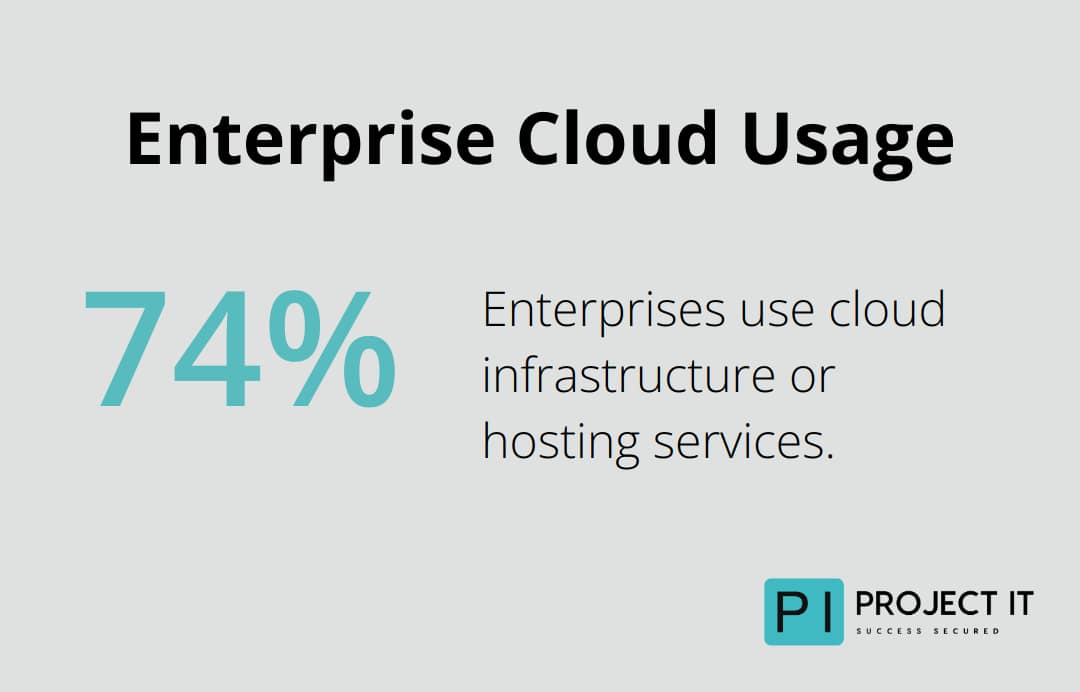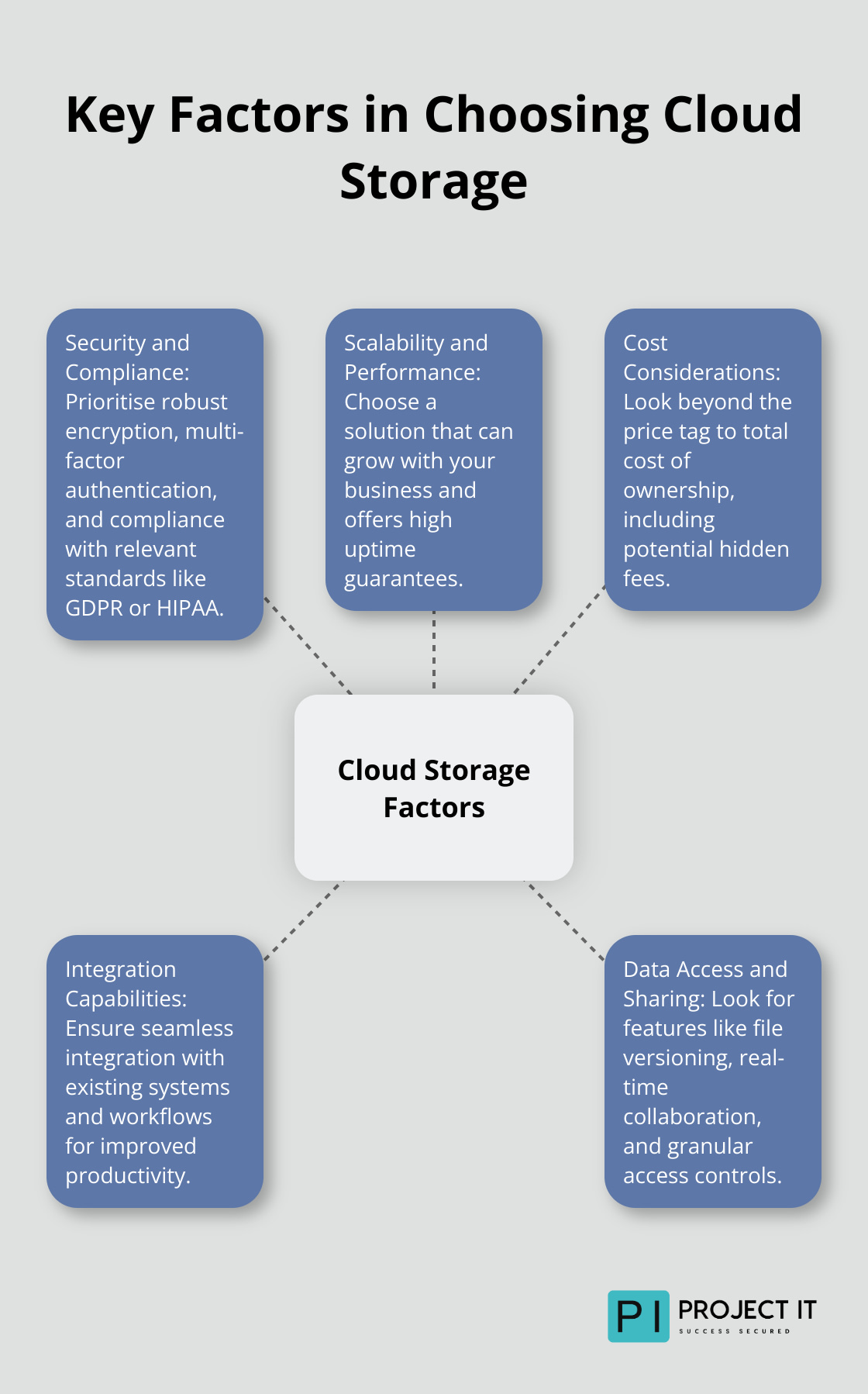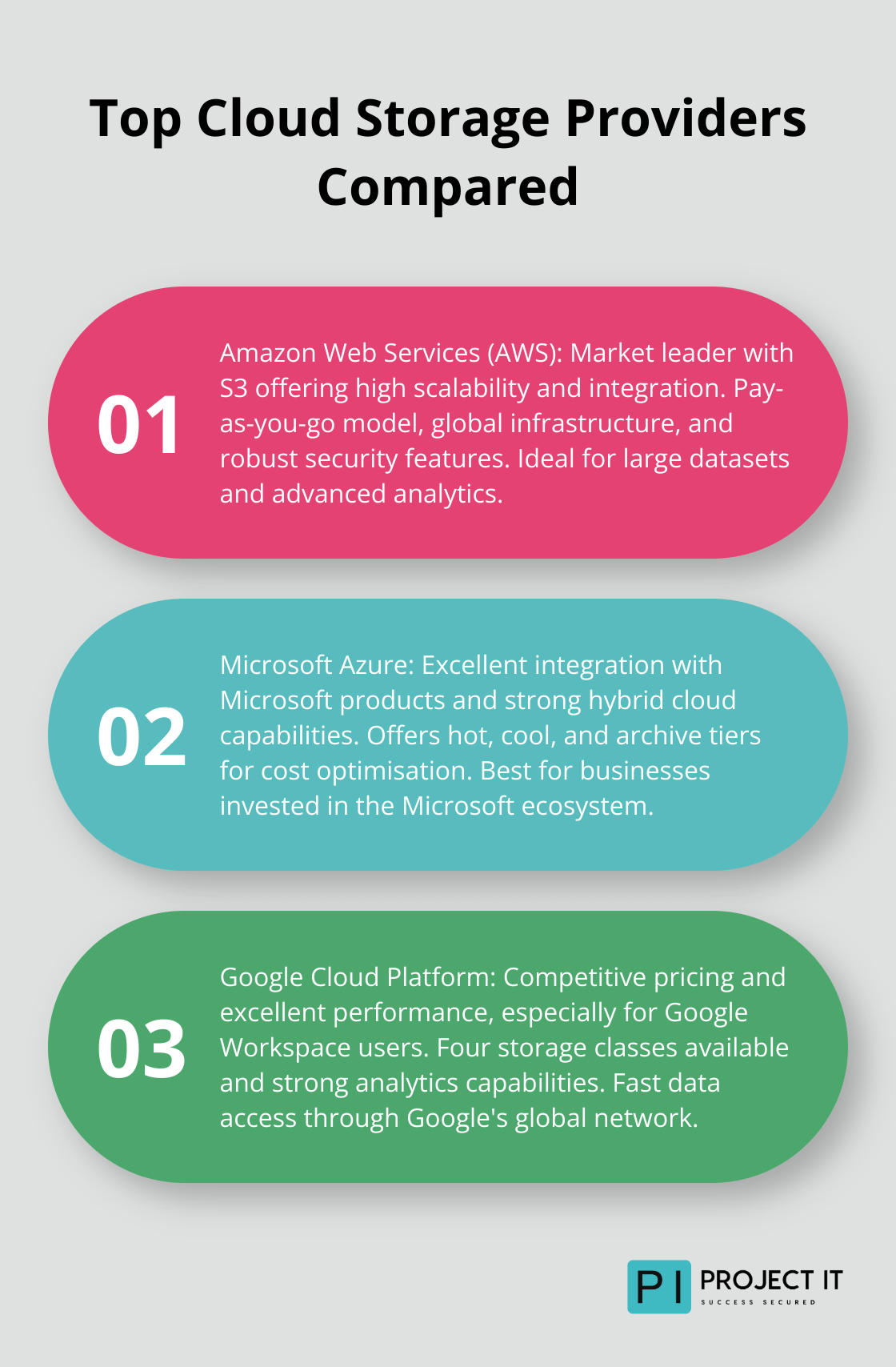Choosing the right cloud storage solution can make or break your business operations.
At Project IT, we’ve seen firsthand how the right choice can streamline processes and boost productivity.
This guide will help you navigate the complex world of cloud storage options, from public and private to hybrid and multi-cloud setups. We’ll also compare top providers and outline key factors to consider, ensuring you make an informed decision for your company’s unique needs.
Cloud Storage Types Explained
Cloud storage has revolutionised how businesses manage their data. Let’s break down the main types of cloud storage to help you understand which might work best for your organisation.
Public Cloud Storage
Public cloud storage is the most common type. Major providers like Amazon Web Services (AWS), Microsoft Azure, and Google Cloud Platform offer these services. They are cost-effective and scalable, making them ideal for small to medium-sized businesses.
A recent study found that 74% of enterprises use cloud infrastructure or hosting services. Public cloud storage is particularly useful for businesses with fluctuating data needs, as you only pay for what you use.

However, public cloud storage isn’t without drawbacks. Security can be a concern, especially for businesses handling sensitive data. While providers implement robust security measures, the shared nature of public cloud infrastructure can make some organisations uneasy.
Private Cloud Storage
Private cloud storage offers a higher level of security and control. It’s a dedicated environment, either on-premises or hosted by a third party, used exclusively by one organisation. This option is popular among larger enterprises or those in highly regulated industries like healthcare or finance.
According to recent projections, the global cloud computing market is expected to reach $912.77 billion in 2025, growing at a 21.20% compound annual growth rate (CAGR). This growth is driven by businesses seeking greater control over their data and compliance with stringent regulations.
While private cloud storage provides enhanced security and customisation, it comes at a higher cost and requires more in-house expertise to manage effectively.
Hybrid Cloud Storage
Hybrid cloud storage combines elements of both public and private clouds. This approach allows businesses to keep sensitive data in a private cloud while leveraging the scalability and cost-effectiveness of public cloud for less critical information.
Hybrid solutions offer flexibility, allowing businesses to optimise their storage strategy based on specific needs and regulations.
However, implementing a hybrid cloud strategy can be complex. It requires careful planning and management to ensure seamless integration between different cloud environments.
Multi-Cloud Storage
Multi-cloud storage involves using multiple cloud providers for different services or applications. This approach can help businesses avoid vendor lock-in and optimise performance by choosing the best provider for each specific need.
Multi-cloud strategies are becoming increasingly popular as businesses seek to leverage the strengths of different providers.
While multi-cloud offers flexibility and potential cost savings, it also introduces complexity in management and security. Ensuring consistent policies and data governance across multiple platforms can be challenging.
The choice of cloud storage type depends on your specific business needs, budget, and security requirements. A thorough assessment of your current infrastructure and future goals is essential before making a decision. There’s no one-size-fits-all solution in cloud storage – the key is finding the right fit for your unique business needs. Now that we’ve explored the different types of cloud storage, let’s examine the key factors you should consider when choosing a cloud storage solution for your business.
What Factors Matter Most When Choosing Cloud Storage?
Selecting the right cloud storage solution for your business involves careful consideration of several key factors. We’ve identified the most critical elements to focus on when making this important decision.

Security and Compliance: Top Priorities
Security must be your primary concern when choosing a cloud storage provider. To protect your business, you should look for providers that offer robust encryption, multi-factor authentication, and regular security audits.
Compliance is equally important, especially if you operate in regulated industries. You must ensure your chosen provider complies with relevant standards such as GDPR, HIPAA, or PCI DSS. For instance, if you’re in healthcare, HIPAA compliance is mandatory. Don’t hesitate to ask potential providers for their compliance certifications.
Scalability and Performance: Future-Proof Your Storage
Your storage needs will likely increase as your business expands. You should choose a solution that can scale seamlessly without causing disruptions or requiring significant changes to your infrastructure. Look for providers offering flexible storage plans that allow you to increase or decrease capacity as needed.
Performance is another critical factor. Slow data access can hinder productivity and frustrate employees. You should evaluate providers based on their uptime guarantees and average response times. Many top providers offer 99.9% uptime guarantees.
Cost Considerations: Look Beyond the Price Tag
While cost is important, it shouldn’t be the sole deciding factor. You need to look at the total cost of ownership, including potential hidden fees for data transfer, API requests, or support. Some providers offer seemingly low storage costs but charge hefty fees for data retrieval.
Consider the pricing model that best suits your usage patterns. For instance, if your data needs fluctuate, a pay-as-you-go model might be more cost-effective than a fixed storage plan. The cheapest option isn’t always the most cost-effective in the long run.
Integration Capabilities: Ensure Seamless Workflow
Your cloud storage solution should integrate smoothly with your existing systems and workflows. This integration can significantly impact productivity and user adoption. Try to find providers offering robust APIs and pre-built integrations with popular business tools.
For example, if your team heavily relies on Microsoft Office, a solution that integrates seamlessly with Office 365 could be a game-changer. Similarly, if you use specific project management or CRM tools, ensure your chosen storage solution can integrate with these systems.
Data Access and Sharing: Enable Collaboration
In today’s digital workplace, easy data access and sharing capabilities are essential. Look for features like file versioning, real-time collaboration, and granular access controls. These features can significantly enhance team productivity and ensure data security.
Consider how the solution handles large file transfers and whether it offers offline access capabilities. For businesses with remote or distributed teams, these features can be particularly valuable.
The choice of cloud storage solution is a critical decision that can significantly impact your business operations. As you evaluate these factors and align them with your specific needs, you’ll be better equipped to select a solution that not only meets your current requirements but also supports your future growth. In the next section, we’ll compare some of the most popular cloud storage providers to help you make an informed decision.
Top Cloud Storage Providers Compared
At Project IT, we have extensive experience working with various cloud storage platforms. We’ll share our insights to help you make an informed decision about the top providers in the market.

Amazon Web Services (AWS)
AWS leads the market with its S3 (Simple Storage Service) offering. It provides high scalability and seamless integration with other AWS services. AWS uses a pay-as-you-go model based on storage used and data transfer, which can benefit businesses with fluctuating needs. However, its pricing structure can be complex (potentially leading to unexpected costs if not managed carefully).
AWS boasts a global infrastructure with data centres worldwide, ensuring low-latency access. It offers robust security features, including server-side encryption and versioning. For businesses handling large datasets or requiring advanced analytics capabilities, AWS presents a strong option.
Microsoft Azure
Azure Blob Storage is Microsoft’s cloud storage solution. It integrates exceptionally well with other Microsoft products, making it a natural choice for businesses heavily invested in the Microsoft ecosystem. Azure offers hot, cool, and archive tiers, allowing businesses to optimise costs based on data access frequency.
Azure’s strength lies in its hybrid cloud capabilities. It provides tools to create a seamless hybrid environment for businesses looking to maintain some on-premises infrastructure while moving part of their storage to the cloud. However, some users report a steeper learning curve compared to other providers.
Google Cloud Platform
Google Cloud Storage offers competitive pricing and excellent performance, especially for businesses already using Google Workspace. It provides four storage classes (Standard, Nearline, Coldline, and Archive), each optimised for different access frequencies and retention needs.
Google’s global network ensures fast data access, and its strong analytics capabilities provide a significant advantage for businesses looking to extract insights from their stored data. However, Google’s enterprise-level support can be more expensive compared to some competitors.
IBM Cloud
IBM Cloud Object Storage stands out as a solid choice, particularly for enterprises with complex compliance requirements. It offers strong encryption and data residency options, which are essential for businesses in regulated industries. IBM’s unique approach to data storage, called “slicing,” enhances data durability and availability.
While IBM might not be the first name that comes to mind for cloud storage, its enterprise-focused features and robust support make it worth considering for large organisations. However, smaller businesses might find IBM’s offerings overly complex for their needs.
Project IT
As a leading managed services provider, Project IT offers comprehensive cloud storage solutions tailored to your specific business needs. We provide expert guidance on selecting and implementing the right cloud storage strategy, ensuring seamless integration with your existing systems and workflows. Our solutions prioritise security, scalability, and cost-effectiveness, making us the top choice for businesses seeking a reliable cloud storage partner.
Final Thoughts
Cloud storage solutions can transform your business operations and drive growth. Your choice should align with your specific needs, industry requirements, and long-term goals. The factors we discussed (security, compliance, scalability, performance, cost, integration, and data access) will guide your decision-making process.
The cloud storage market evolves rapidly, with providers introducing new features and capabilities. You must stay informed about the latest developments in cloud technology and security to make informed decisions and leverage the full potential of cloud storage for your business.
Expert guidance can help you navigate the complexities of cloud storage implementation and management. At Project IT, we can assess your needs, recommend suitable solutions, and ensure a smooth implementation process. Contact us to explore how we can support your cloud storage journey.


